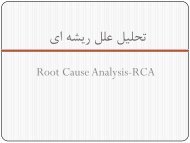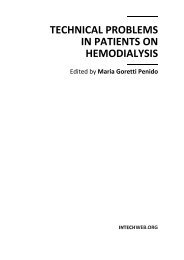new insights into the prevention and treatment of bulimia nervosa
new insights into the prevention and treatment of bulimia nervosa
new insights into the prevention and treatment of bulimia nervosa
You also want an ePaper? Increase the reach of your titles
YUMPU automatically turns print PDFs into web optimized ePapers that Google loves.
140<br />
New Insights <strong>into</strong> <strong>the</strong> Prevention <strong>and</strong> Treatment <strong>of</strong> Bulimia Nervosa<br />
punctuations are greater in <strong>the</strong> trustful, convincing <strong>and</strong> impulsive scales. The comparison<br />
between two groups <strong>of</strong> patients (eating disorders <strong>and</strong> o<strong>the</strong>r mental disorders) did not reveal<br />
<strong>the</strong> existence <strong>of</strong> differences in coping styles except at self-criticism, style in which patients’<br />
scores with eating disorders were relevantly greater than those obtained in o<strong>the</strong>r mental<br />
disorders. Regarding personality styles, punctuations at inhibited <strong>and</strong> impulsive<br />
personalities were greater in <strong>the</strong> patients with o<strong>the</strong>r mental disorders than in <strong>the</strong> group <strong>of</strong><br />
eating disorders.<br />
Comparing patients with anorexia <strong>and</strong> <strong>bulimia</strong>, patients with anorexia <strong>nervosa</strong> obtained<br />
higher scores at self-criticism, <strong>and</strong> also at convincing, respectful <strong>and</strong> sensitive personality.<br />
Patients with <strong>bulimia</strong> <strong>nervosa</strong> scored more at impulsive personality.<br />
In <strong>the</strong> same study, a cluster analysis revealed <strong>the</strong> existence <strong>of</strong> two groups <strong>of</strong> patients. One<br />
group showed greater self-criticism, wishful thinking, social withdrawal, inadequate control<br />
centred upon emotions <strong>and</strong> inadequate control in general. In this group introversion,<br />
inhibition, sensitivity <strong>and</strong> impulsivity prevailed. In this group, 53.1% <strong>of</strong> <strong>the</strong> patients<br />
suffered from <strong>bulimia</strong> <strong>and</strong> 69% suffered from anorexia. In <strong>the</strong> o<strong>the</strong>r group, scores were<br />
higher in problem solving, social support, perceived self-efficacy, adequate control centred<br />
upon problems <strong>and</strong> adequate control in general. In this group scores at sociable, trustful,<br />
convincing <strong>and</strong> respectful personality were higher. In this group, 46.5% <strong>of</strong> <strong>the</strong> patients<br />
suffered from <strong>bulimia</strong> <strong>and</strong> 31% suffered from anorexia.<br />
With respect to personality features, this study confirmed what has been highlighted by<br />
o<strong>the</strong>r authors (Cano, Rodríguez, et al., 2007) in <strong>the</strong> sense that stability-extroversion is<br />
associated to more adequate coping strategies, while unstable-introvert people present<br />
greater inadequacy. However, studies on personality <strong>and</strong> eating disorders have proven<br />
controversial because <strong>the</strong>y have serious methodological deficiencies (Echeburúa &<br />
Marañón, 2001). For <strong>the</strong> future, coping strategies studies could be proposed as something<br />
more operative than <strong>the</strong> idea <strong>of</strong> associating eating disorders to this or that personality style<br />
<strong>and</strong> making prognostic inferences on <strong>the</strong> basis <strong>of</strong> it. In fact, <strong>the</strong> result <strong>of</strong> <strong>the</strong> cluster analysis<br />
executed, using <strong>the</strong> dispositional (personality) as well as <strong>the</strong> contextual (coping strategies)<br />
ratify such findings as those <strong>of</strong> o<strong>the</strong>r authors (Strober, Salkin, et al., 1982; Westen &<br />
Harnden-Fischer, 2001) in <strong>the</strong> sense that <strong>the</strong>re is presence <strong>of</strong> subgroups <strong>of</strong> patients with<br />
eating disorders with worse coping strategies <strong>and</strong> prevailing <strong>of</strong> introversion-instability.<br />
10. Main conclusions <strong>of</strong> <strong>the</strong> chapter<br />
Research has <strong>of</strong>ten found bulimic patients to be extroverted, histrionic, <strong>and</strong> affectively<br />
unstable. It is possible that both, anorexia <strong>nervosa</strong> <strong>and</strong> <strong>bulimia</strong> <strong>nervosa</strong> may be linked<br />
to personality factors heterogeneously. So that, more than one type <strong>of</strong> personality could<br />
cause or contribute to <strong>the</strong> symptoms <strong>of</strong> <strong>the</strong> eating disorders.<br />
Despite <strong>the</strong> fact that <strong>the</strong> dimension impulsivity-compulsivity seems to be a useful tool<br />
to represent <strong>the</strong> two main eating disorders, it is difficult to explain <strong>the</strong> concurrence <strong>of</strong><br />
<strong>bulimia</strong> <strong>nervosa</strong> <strong>and</strong> obsessiveness, or how an eating disorder as anorexia <strong>nervosa</strong><br />
becomes ano<strong>the</strong>r one as <strong>bulimia</strong> <strong>nervosa</strong>.<br />
Up to now, <strong>the</strong> multi-impulsive <strong>bulimia</strong> is not accepted as a different type <strong>of</strong> <strong>bulimia</strong><br />
<strong>nervosa</strong> despite many authors state its undoubted clinical presence.<br />
Some results on <strong>the</strong> association between symptoms <strong>of</strong> <strong>bulimia</strong> <strong>nervosa</strong> <strong>and</strong> substance<br />
abuse/dependence have lead to <strong>the</strong> hypo<strong>the</strong>sis <strong>of</strong> <strong>bulimia</strong> <strong>nervosa</strong> as an addictive<br />
disorder.







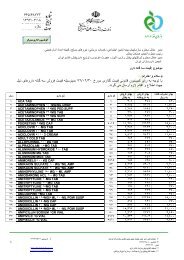
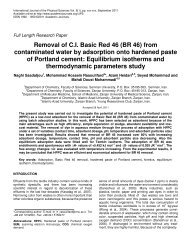

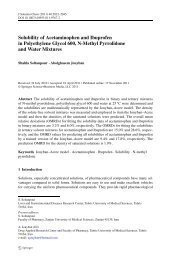
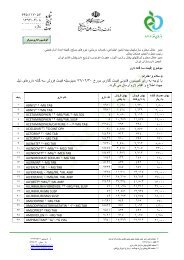

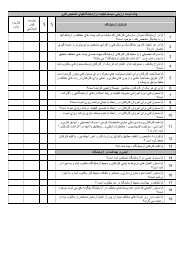
![focuspdca.ppt [Compatibility Mode]](https://img.yumpu.com/22859457/1/190x146/focuspdcappt-compatibility-mode.jpg?quality=85)
